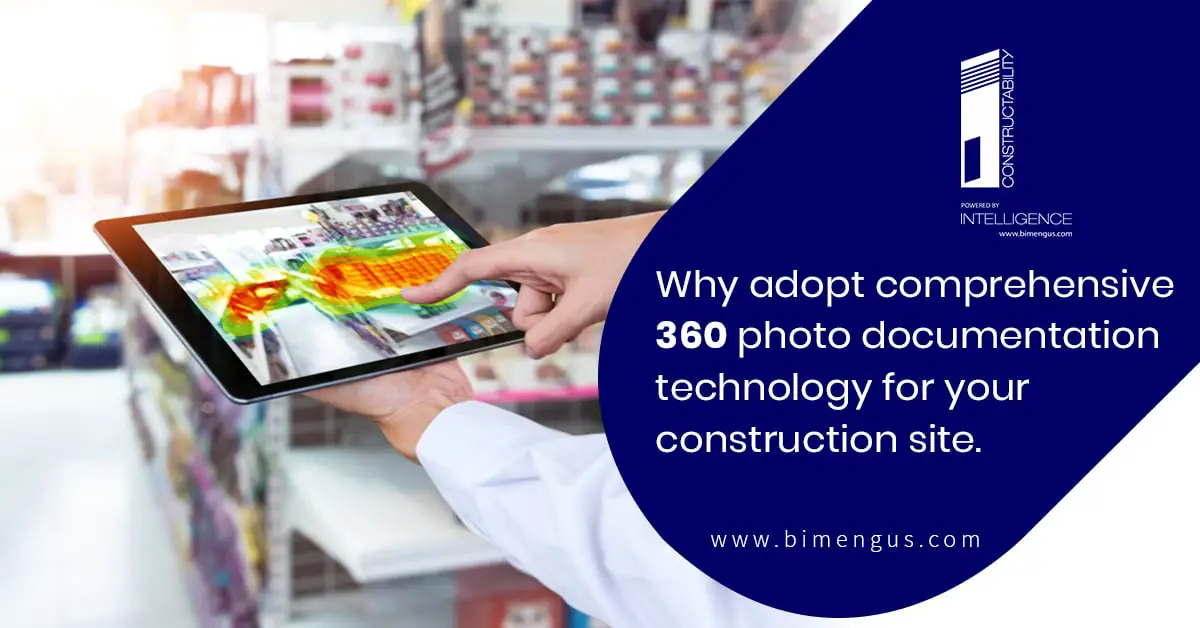Taking photographs to record progress and issues is a known practice in modern construction. As pictures paint a thousand words, a construction professional or facility manager can immediately interpret photographs – especially 360 VR photographs.
Each photograph delivers a time-stamped visual of construction elements and materials. Photo documentation on construction sites can be challenging as there are numerous people, equipment, and materials present at the same time. With the increasing value of technology in the construction sector, the complete photo capture process has improved for the better.

Regularly taking 360 VR photographs has proven to:
• Improve communication and complete project milestones across various teams and project stakeholders
• Track project progress including movement and installation of elements and materials
• Provide evidence of contract compliance
• Augment as-built documentation provided to facility managers at the delivery stage
Photo documentation in construction has evolved from physical photos to its digital counterparts through 3600 photography stored through cloud storage. From a study, 360 o cameras were the second most used capturing device on construction sites in the year 2018. It is also important to manage your 360 photos with a great tool set that helps you manage photos by time and location whilst preparing your as-built documentation.
For construction experts and developers, the margin for error on any new project is very slim. Nearly 80% of the projects end up over budget. But, recently job sites are operating with higher efficiency through 360-degree site
photography.
This guide helps outline the best practices concerning 360 o photos captured onsite. It would also help you save time and money to capture and manage onsite 360 photos.
The Harvey Milk Terminal 1 at San Francisco International Airport is a $1.2 B project. This project includes an enhanced passenger check-in, a security checkpoint, a re-compose area, a new Individual Carrier System, Baggage Handling, and a new mezzanine with connections to the Air Train and Central Parking Garage, and a secure connector to terminal A. Project contractors leveraged collaborative photo capture for large projects and image content categorization to find photos by activity. 15 Field Engineers were responsible to document their area on the site which was captured independently and further collaborated on in the workflow providing an annual savings of 4680 hours. The value of 360 photo documentation during various stages of construction.
The Pre-construction Phase.
During the pre-construction or design phase, it is always important to think about project documentation that can scale. There are some tips to keep in mind to begin your project.
1. Track your log or Break the site into various areas.
Breaking your site into various areas of approximately 100 – 250 square feet can help make it easier to track your progress. Various Field Engineers can be responsible for separate areas. Each individual can track the progress of their area using weekly progress photos. For example, if the area “A” is not documented completely due to ongoing activity like steel work, crane activity, etc. it should be documented and resolved by the Field Engineer.
2. Labeling your 360-degree cameras.
If multiple cameras are deployed by various Field Engineers, it is important to label each camera. With other tools and equipment, it is also useful to adopt a tracking log and store the cameras in the same location.
3. Using the right cloud-storage.
Using cloud-based storage to back up your 360 photos helps maintain a consistent experience across the project. It helps construction stakeholders store and organizes 360 photos that can be accessed on any device using a web browser.
4. Adopt documentation software.
A 360 camera is paired with various devices or software that integrates with a dedicated 360 construction progress tracking software. All the pictures are linked to the specific location on the sheet or floor plan of the project and are organized by the timestamp as well.
5. Modern Visualization software.
360 o photos need software to view them. This software needs to process multiple VR images without being skewed. Besides, it is also important for every project stakeholder of the photo capture and viewing team to view these images correctly.
The Construction Phase.
1. Positioning the 3600 camera in the right way.
This phase of the building project is often documented using 360-degree cameras. A 3600 camera mounted on a tripod helps project stakeholders capture the entire space through an unobstructed view.
2. Location of the photo.
Photos are most effective when clicked from the same location. Marking areas with a marker during ongoing construction helps improve consistency.
Contact Us: – 703-994-4242
Visit us: – https://blog.bimengus.com/adopt-comprehensive-360-photo-documentation-technology-construction-projects-2/





